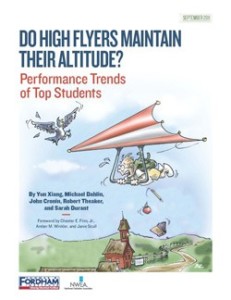Fordham Releases Study On Performance Trends of Top Students

The Thomas Fordham Institute released today “Do High Flyers Maintain Their Attitude? Performance Trends of Top Students,” a study that examines high-achieving students over time.
The study reports found that 30 to 50 percent of America’s best students fail to maintain their performance levels and learning acceleration over time compared to lower-achieving peers. The concern lies in whether our system or efforts in the era of No Child Left Behind have stifled the ability for half our “high flyers” to continue to academically perform.
Some of the major reasons that high-achieving students begin to underperform, the study says, includes a lack of resources available to schools and inadequate policies that provide curricula and instructional practices for top students.
Improving the school system in the United States requires us to not only build up low-achieving schools, but to give high-achieving students a place to thrive and continue to excel. The study’s conclusion says that “every casualty among this group is a loss in potential human capital” and the future of our economy.
“If America is to remain internationally competitive, secure and prosperous,” said Chester E. Finn, Jr., Fordham’s president, “we need to maximize the potential of all our children, including those at the top of the class. Today’s policy debate largely ignores this ‘talented tenth.’ This study shows that we’re paying a heavy price for that neglect, as so many of our high flyers drift downward over the course of their academic careers.”
The study, which builds of previous research by Fordham and Tom Loveless, was funded by the Kern Family Foundation and the Thomas B. Fordham Foundation. Click here to learn more.





0 Comments
Leave a Comment
Your email address will not be published. All fields are required.